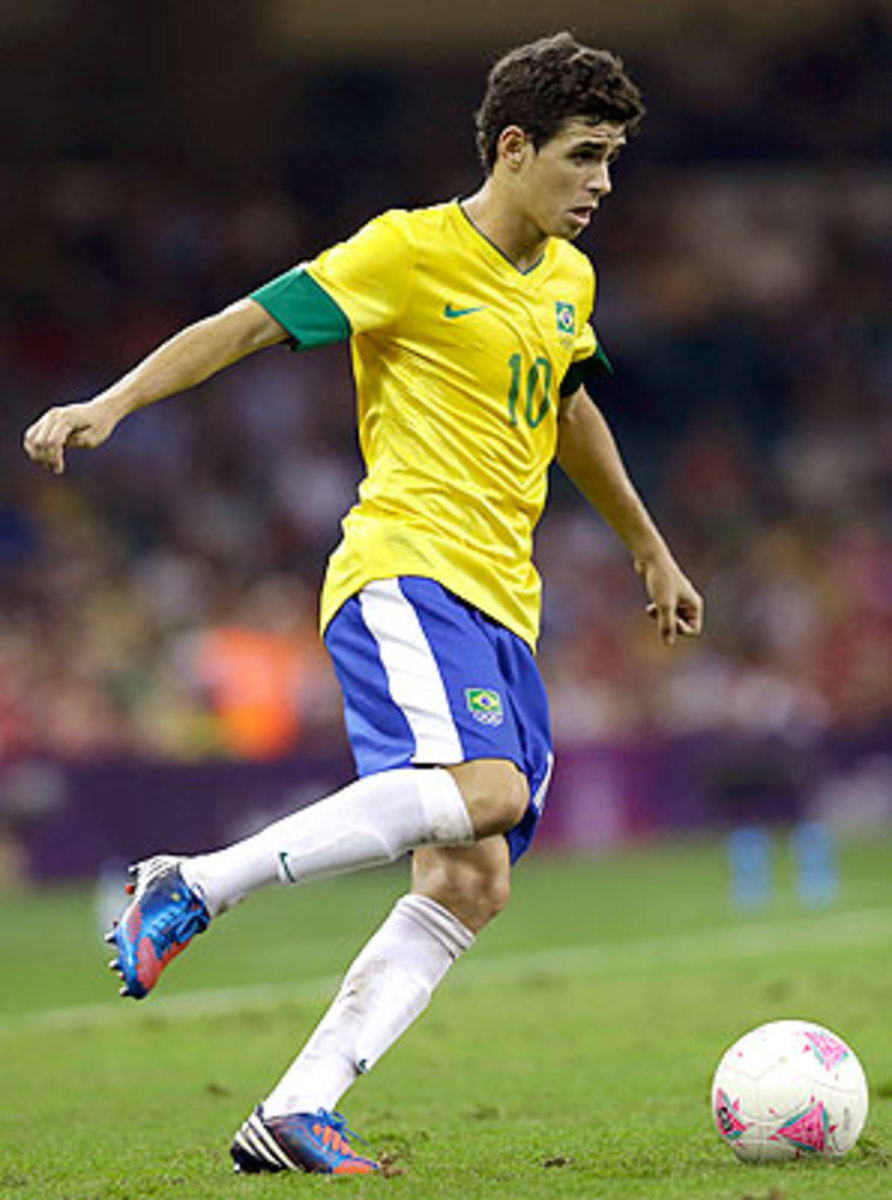
Brazil makes furious statement in first Olympic game against Egypt
At half time it looked as though Brazil was making a furious statement of intent. It has never won the Olympic soccer gold and, 3-0 up against Egypt, it was making clear that it doesn't intend to be thwarted this time. By the end of the game, it wasn't exactly clinging on, as 3-0 had become 3-2, and the amount of work Mano Menezes still has to do was clear.
The Brazil coach has made clear that, with no qualifiers to prepare for the World Cup it will host in 2014, he sees this as a key part of his side's build-up. The good news for him is that the front four is working magnificently together. The bad news is that the back seven, despite being bolstered by two overage players, Marcelo and Thiago Silva, isn't. Brazil did enough to start with a win, but the luster of the first half was seriously dimmed by the carelessness of the second.
Oscar, signed by Chelsea this week, scored the first two goals. The first one started with a dart inside followed by an angled ball and, while it might have been aimed at Hulk, Rafael got in the way and took advantage of the way the pass had split the defense with a calm finish. The second came from a long ball, which everybody missed. Oscra, having run on, had the presence of mind not to shoot from a narrow angle but to pull the ball back for Leandro Damiao to score.
Oscar scored a hat trick in the final of the Under-20 World Cup, but with the range and intelligence of his passing, he had proved that he was the outstanding player of the tournament even before that. He might not quite have the physique or the change of pace, but in his ability to size up a game in its entirety and select the right pass, there is something of the young Kaka about him.
It was the more vaunted Neymar who scored the third. There was little room for playmaking when he gathered the ball on the right, but his diagonal run infield created space for a pass outside to Hulk, who had swapped wings with him momentarily. Hulk dinked the ball back into the middle and Neymar scored with a firm header. The front floor was fluid and incisive and played with the sort of mutual understanding that -- generally -- takes weeks to acquire. This could possibly be Brazil's front four at the World Cup.
It safe to assume there'll be changes at the back, though. Neto, the goalkeeper, inspired little confidence and made clear just why Emerson Leao, Brazil's keeper at the 1974 and 1978 World Cups spoke earlier in the year about how pessimistic he is about the future of Brazilian goalkeeping with Julio Cesar seemingly past his best. Juan and Thiago Silva simply didn't gel at center-back. And when Mohamed Abou Treika struck to give Egypt hope, there were an extraordinary number of defenders who failed to react in the box. Perhaps that was complacency, perhaps just sloppiness, but either way it needs stamping out.
At least, though, Brazil hung on to win. Spain, the other favorite, had earlier been well-beaten by Japan. For half an hour or so it had been like watching the senior team, but the senior team doesn't allow itself to be panicked by opponents. Japan's controlled pressing -- not constant, but organized -- had already led to a couple of uncharacteristic long balls when Spain's marking broke down completely at a corner. David De Gea started to come and then went back, Martin Montoya lost Yuki Otsu and he stabbed in on the bounce. That prompted panic. There'd already been one awful backpass when Inigo Martinez was put under pressure by a poor ball and ended up hauling down Kensuke Nagai to earn a red card. From then on the game was a catalogue of Japan chances and only some poor finishing and a couple of excellent saves from De Gea prevented Japan winning for more comfortably.
Spain did improve once Oriel Romeu had come on for Isco and it had dominated possession until the red card, so there's still every chance it will make it through a group that also includes Honduras and Morocco -- who drew 2-2 earlier in the day -- but the capitulation, the psychological weakness, was both unexpected and concerning.
Uruguay had problems too, looking oddly off the pace early on against a dynamic UAE team. Omar Abdulrahman's superb through-pass laid in Ismail Matar to give the UAE the lead, and it could easily have been further ahead before Gaston Ramirez whipped in a superb free-kick just before half-time. Then Oscar Washington Tabarez worked his magic. El Maestro's ability to change the momentum of a game with a couple of tactical tweaks has been a key feature of Uruguay's recent run of success, and he did so again. Off went the right-wing-back Matias Aguirregaray, who had been one of Uruguay's more positive players in the first half, and on came the inconsistent Nicolas Lodeiro. 3-5-2 became 4-4-2 and Uruguay began to dominate, pushing back the UAE full backs and taking control of midfield. It was Lodeiro who had an excellent half, who got the winner after a precise build-up but, once again, it was Tabarez who turned the game.





